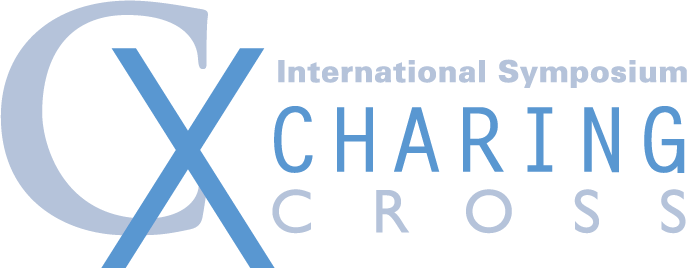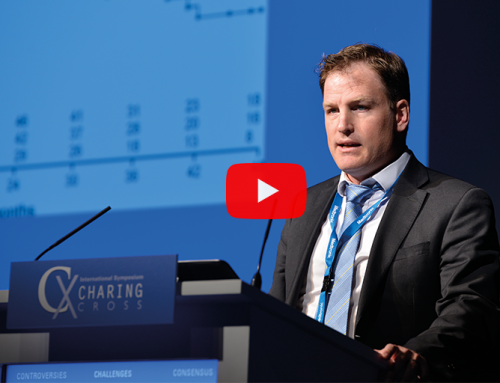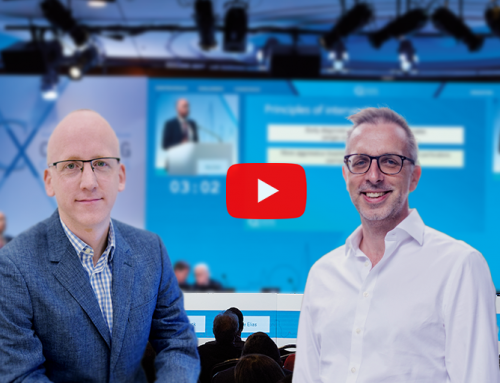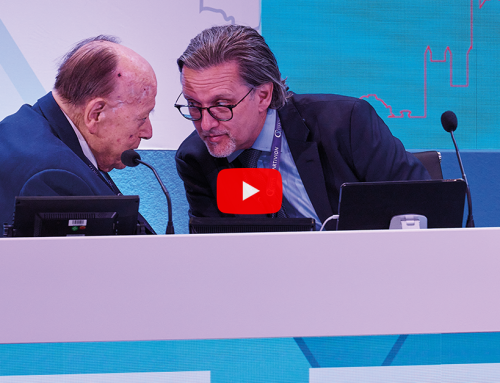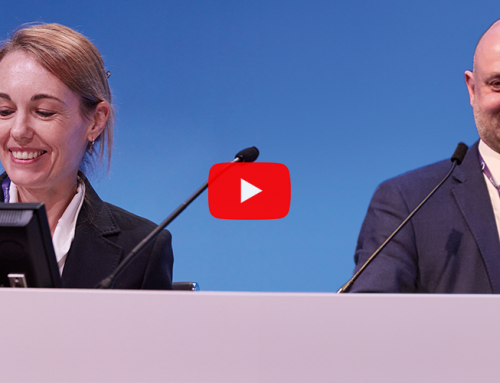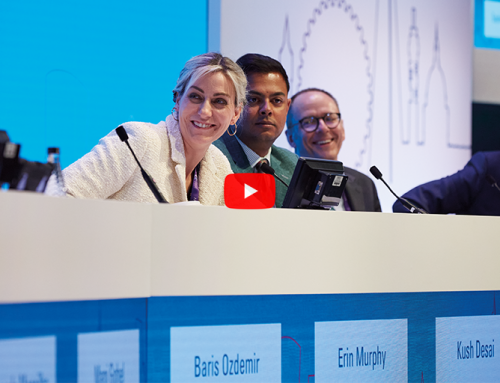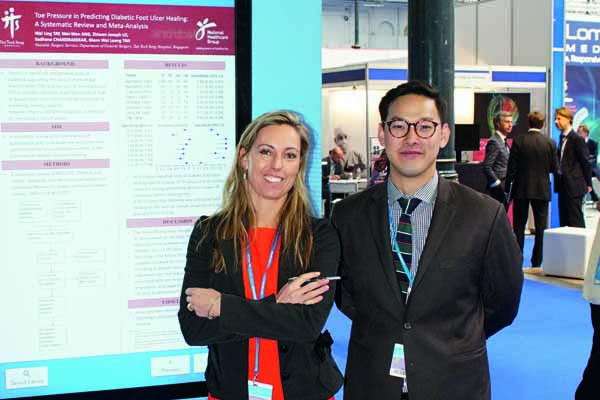
Poster prize winner Wei-Wen Ang with CX Abstract Board and Poster member Anna Prent
At Charing Cross 2018, abstracts were presented—across 17 sessions—on the five programme areas of CX: Acute stroke, Thoracic Aortic Abdominal Aortic, Peripheral, Venous, and Vascular Access. Additionally, throughout the symposium, delegates had the opportunity to visit the CX Poster Gallery. On Day 2 of CX 2018, 12 of these posters were presented during the lunch hour. In recognition of the large number of high-quality abstracts that CX receives each year, this year, a new category of abstracts was created—“Global Stars and Rising Stars”. The aim of this new category was to promote high-quality abstracts that were submitted by less well-known but laudable researchers from a global pool of talent.
Abstract presenters who were recognised as a “Global Star and Rising Star” were given CX Faculty status. Furthermore, their abstract will be considered as a potential topic for a future CX session. Acknowledging the high quality of all the abstracts that were submitted this year, all abstracts presenters (non-Global Stars and Rising Stars) were given CX Associated Faculty Status.
Abstract Prize Winners
Trainee: Regent Lee (Headington, UK); Applied machine learning for the prediction of growth of abdominal aortic aneurysm in humans (Abdominal Aortic)
Senior: Andrej Schmidt (Leipzig, Germany); Results of the Frontier III trial; large access hole vascular closure device based on fully absorbable patch (Abdominal Aortic)
Vascular Access Abstract Prize
Jeffrey Hull (North Chesterfield, USA); US multicentre trial of percutaneous arteriovenous fistulae creation for haemodialysis access
Poster Prize
Wei-Wen Ang (Singapore); Toe pressure in predicting diabetic foot ulcer healing: a systematic review and meta-analysis (Peripheral)
Certificate of Merit Winners 2018
Trainee clinicians
Acute Stroke
Leonie Fassaert (Utrecht, The Netherlands); Perioperative haemodynamics and cerebral monitoring of carotid endarterectomy patients: A Dutch Audit
Abdominal Aortic
Liam Musto (Maidstone, UK); Enhanced recovery after surgery in open aortic surgery
Kim Taeymans (Antwerp, Belgium); Three year outcome of the covered endovascular reconstruction of the aortic bifurcation (CERAB) technique for aortoiliac occlusive disease
Peripheral
Sam Pashneh-Tala (Sheffield, UK); Tissue-engineered blood vessels with user-defined geometries-technology for the future of vascular grafting
Sanne Klaphake (Rotterdam, The Netherlands); Long-term outcome of a randomised trial comparing endovascular revascularisation plus supervised exercise with supervised exercise only for intermittent claudication
Nick S van Reijen (Amsterdam, The Netherlands); Cost-effectiveness analysis of a multicentre randomised controlled trial (SUPER): Endovascular revascularisation or supervised exercise therapy for intermittent claudication due to iliac artery obstruction
Florian Enzmann (Salzburg, Austria); Stent versus bypass for femoropopliteal TASC II type C and D lesions-preliminary data of a prospective randomised trial
Ruth Benson (Birmingham, UK); Investigation of female gender as a risk factor for outcomes following presentation with severe limb ischaemia in the setting of the randomised BASIL trial
Sophie de Gier (Doetinchem, The Netherlands); The effect of percutaneous flexor tenotomy on healing and prevention of foot ulcers in patients with claw deformity of the toe
Venous
Albert Abhinay Kota (Vellore, India); Novel strain gauge plethysmography
Senior clinicians
Acute Stroke
Konstantin Andreychuk (St Petersburg, Russia); Outcomes after eversion carotid endarterectomy: A comparison between typical and glomus-sparing technique
Thoracic Aortic
Massimiliano Maria Marrocco-Trischitta (San Donato Milanese, Italy)
Increased displacement forces in proximal landing zone 3 for TEVAR in patients with type III arch
Vincenzo Brizzi (Bordeaux, France); Irradiation reference levels during complex EVAR in a high-volume vascular surgery centre
Abdominal Aortic
Matthias Trenner (Munich, Germany); High annual hospital volume is associated with lower rates of adverse event rates following treatment of abdominal aortic aneurysms. Analysis of nationwide German DRG data from 2005 to 2013
Wolfgang Hofmann (Feldkirch, Austria); In situ reconstruction using vascular xeno-pericardial grafts for life-threatening aortoiliac infection
Arno Wiersema (Amsterdam, The Netherlands); Heparin during non-cardiac vascular interventions: Time to ACT!
Peripheral
Steven Rogers (Manchester, UK); Peripheral angiography by contrast-enhanced 3D tomographic ultrasound
Venous
Michael Dake (Stanford, USA); A unique bioconvertible inferior vena cava filter: Two-year results from the SENTRY study
Robert Mendes (Raleigh, USA); Single-centre experience of the Sentry bioconvertible inferior vena cava filter: A paradigm shift in pulmonary embolism protection
CX 2017 Certificate of Merit winners who presented at CX 2018
Kakkhee Yeung (Amsterdam, The Netherlands)
CX 2018: The clinical outcome of aortic aneurysms (growth rate and rupture): Prediction by studying anatomy and genes (CX Global Stars and Rising Stars—Abdominal Aortic Abstract Presentations)
CX 2017: Using skin biopsies to study contractile function of smooth muscle cells in aortic aneurysms (CX Abstract Presentations—Thoracic Aortic)
Guy Martin (London, UK)
CX 2018: The impact of preoperative psychosocial comorbidities on short-term outcomes following elective aortic aneurysm repair (CX Global Stars and Rising Stars—Abdominal Aortic Abstract Presentations)
CX 2017: Understanding anti-hypertensive medication adherence in chronic type B aortic dissection; an important consideration in the management debate? (CX Abstract Presentations—Thoracic Aortic)
Celine Deslarzes-Dubuis (Lausanne, Switzerland)
CX 2018: Aortoiliac and renal haemodynamic modification after EVAS (CX Global Stars and Rising Stars—Abdominal Aortic Abstract Presentations)
CX 2017: Chimney graft technique combined with the Nellix Endovascular Aneurysm Sealing technology for complex abdominal aortic aneurysms (CX Abstract Presentations—Thoracic Aortic)
Hong-Yau Tan (Bedford Park, Australia)
CX 2018: Supervised exercise training (SET) increases apoptosis in the symptomatic calf and thigh in patients with intermittent claudication (CX Global Stars and Rising Stars—Peripheral Abstract Presentations)
CX 2017: Comparison between vascular, pulmonary and cardiac rehab programmes (CX Abstract Presentations—Peripheral)
Tobias Hirsch (Halle, Germany)
CX 2018: The pros and cons of endovenous cyanoacrylate (Venous Controversies plenary programme)
CX 2017: Acrylate adhesion of saphenous varicose veins: what do we know about the allergenic potential? (CX Abstract Presentations—Venous)
Petrut Gogalniceanu (London, UK)
CX 2018: Microvascular surgery for paediatric AV fistula formulation—culture, technique, and outcomes (CX Vascular Access Masterclass)
CX 2017: Angioplasty in paediatric arteriovenous fistulae—clinical and radiological outcomes (CX Abstract Presentations—Vascular Access)

